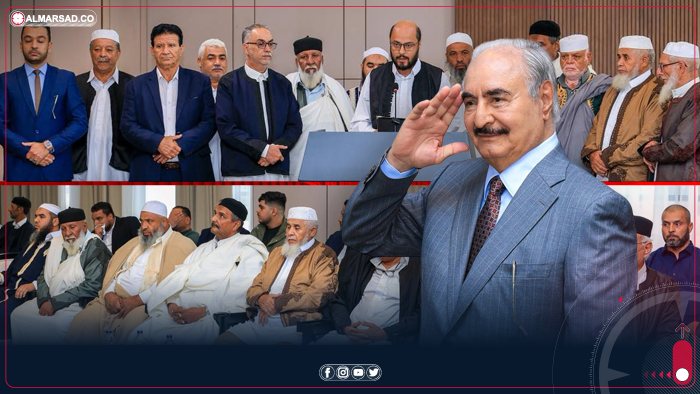BENGHAZI, Libya: On opening night in Benghazi, the choreography was intentional and the message was unmistakable. The Arab Media Conference 2025 lifted its curtain to a packed hall with tight logistics, a polished welcome and a cinematic production, as Almarsad reported from the venue and spoke with prominent guests.
The evening began on a red carpet arranged by the private organizer, Al-Raya Libyan Media Company, leading into an overture in which musicians stitched together the national anthems of Arab states into a single piece. The score gave way to a staged vignette titled “The Story of Benghazi,” presenting the city as a place rising from the clichés of conflict toward a more open and forward-looking chapter.
From the lectern, Al-Raya set out an agenda: build a lasting annual professional forum, convert talk into training, and anchor the industry’s digital transition in practical partnerships. Sponsors were then recognized in front of an audience already trading business cards and programming ideas. The ceremony closed on a deliberately local note with “Ta‘eesh Biladna” (Long Live Our Country) performed by the Libyan trio Mohamed Al-Wushaysh, Intissar Atiya and Abu-Bakr Mohamed, a musical salute to residents and visiting delegates.
Guests praise the production and the city
Attendees widely praised the organization and hospitality. In a conversation with Almarsad, veteran Lebanese broadcaster and former information minister George Kordahi said, “We found Benghazi, in reality, to be a city rebuilding itself, unlike the picture one often hears in the media.”
Libyan television host Mohamed Zidan told Almarsad, “Today we presented another face of Benghazi and of Libya at the Arab Media Conference.”
Egyptian media figure Hala Sarhan said, “We were astonished by Benghazi’s current reality compared with what we used to hear during the harsher years.”
Libyan creator Mohamed Al-Silini (“Rahallista”) described the gathering as “a major moment for Arab media in Benghazi,” expressing hope that it will yield concrete gains for the city and the country.
Deals on the floor: training and AI
Amid the pageantry, the conference moved quickly to execution. Dubai Media Academy signed an agreement with Al-Raya for training and digital media, with an explicit focus on transferring artificial-intelligence know-how from Dubai to Benghazi. Organizers presented the accord as an effort to tether the rhetoric of “future media” to measurable skills programs.
Backed by private sponsors
The event is privately organized and funded. Sponsors include Tosyali Libya (steel), Berenice, Med Sky, Berenice Airlines and the Commerce & Development Bank, alongside other private-sector partners. Organizers cast the financing as a market-driven commitment that matches the conference’s practical ambitions.
Big names, full halls, forward agenda
Over three days, sessions will range from newsroom transformation and skills pipelines to cross-border collaborations. Notable attendees at the opening and panels include May Chidiac, Nishan Derharoutunian, Bossi Shalabi, Arwa, Sami Al-Qasimi, Ameera Al-Fadhel, Brouain Habib, Rula Al-Tarawneh, Hind Khlaifat and Egyptian broadcaster Mahmoud Saad, among others.
For Benghazi, night one was both a spectacle and a statement: a stitched-together anthem, a staged narrative and a slate of agreements that aim to turn a new storyline into measurable outcomes.
Almarsad | On-site reporting














